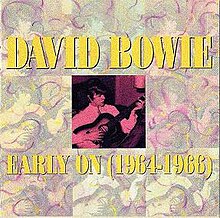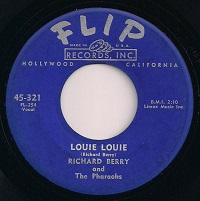
"Louie Louie" is a rhythm and blues song written and composed by American musician Richard Berry in 1955, recorded in 1956, and released in 1957. It is best known for the 1963 hit version by the Kingsmen and has become a standard in pop and rock. The song is based on the tune "El Loco Cha Cha" popularized by bandleader René Touzet and is an example of Afro-Cuban influence on American popular music.

Manfred Mann were an English rock band, formed in London and active between 1962 and 1969. They were named after their keyboardist Manfred Mann, who later led the successful 1970s group Manfred Mann's Earth Band. The group had two lead vocalists: Paul Jones from 1962 to 1966 and Mike d'Abo from 1966 to 1969. Other members of various group line-ups were Mike Hugg, Mike Vickers, Dave Richmond, Tom McGuinness, Jack Bruce and Klaus Voormann.
The Action were an English band of the 1960s, formed as the Boys in August 1963, in Kentish Town, North West London. They were part of the mod subculture, and played soul music-influenced pop music.
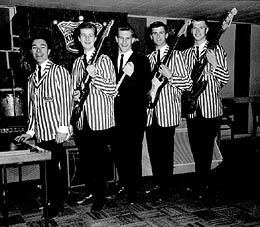
The Kingsmen are a 1960s American rock band from Portland, Oregon. They are best known for their 1963 recording of R&B singer Richard Berry's "Louie Louie", which held the No. 2 spot on the Billboard charts for six weeks and has become an enduring classic.

PYE or Pye Records is an independent British record label. It was first established in 1955 and played a major role in shaping rock 'n' roll and pop music history. The Pye name was dropped in 1980 due to trademark issues, after which it produced almost no music until the company name and trademark was acquired by the Scottish broadcaster and music producer, Tony Currie, in September 2024.
Sheldon Talmy is an American record producer, songwriter and arranger, best known for his work in the 1960s with the Who, the Kinks and many other artists.

"Dancing in the Street" is a song written by Marvin Gaye, William Stevenson, and Ivy Jo Hunter. It first became popular in 1964 when recorded by Martha and the Vandellas whose version reached No. 2 on the Billboard Hot 100 chart for two weeks, behind "Do Wah Diddy Diddy" by Manfred Mann and it also peaked at No. 4 on the UK Singles Chart. It is one of Motown's signature songs and is the group's premier signature song.

"Do Anything You Say" is a single by the English musician David Bowie, his first release solely credited to himself. Released by Pye Records on 1 April 1966, it was produced by Tony Hatch and featured contributions from his new backing band, the Buzz. The song failed to chart and has been negatively received by his biographers.

"I Dig Everything" is a single by the English singer-songwriter David Bowie. It was his final single for Pye Records, released on 19 August 1966. The track was originally demoed with Bowie's then-band, the Buzz, but producer Tony Hatch was unhappy with their efforts and replaced them with session players. It is a pop song that musically and lyrically reflected the mid-1960s Swinging London era. The single was another commercial failure and resulted in the label dropping him. The original recording was included on the Early On (1964–1966) compilation in 1991.

"Rubber Band" is a song by the English singer-songwriter David Bowie. It was recorded in October 1966 following Bowie's dismissal from Pye Records and helped secure him a record contract with Decca-subsidiary Deram Records, who released it as a single in the United Kingdom on 2 December of the same year. A departure from the mod-style sound of his previous releases, "Rubber Band" displays a style informed by vaudeville and British music hall – influenced particularly by British actor Anthony Newley. The lyrics tell the story of a man who goes off to war and, upon his return, finds his lover fell for a brass band conductor.
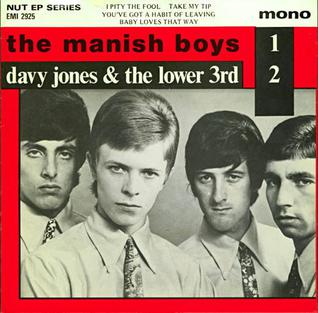
"You've Got a Habit of Leaving" is a song by the English singer-songwriter David Bowie, recorded and released as a single on 20 August 1965 through Parlophone. Released under the name Davy Jones, it featured his band at the time, the Lower Third, whose contributions were uncredited. Produced by Shel Talmy and recorded in early July 1965, the single marked a departure from the Americanised R&B of his two earlier singles into Who-style mod music. The original recording later appeared on the compilation albums Early On (1964–1966) (1991) and Nothing Has Changed (2014).
"Baby Loves That Way" is a song written by David Bowie in 1965 and released as the B-side of single "You've Got a Habit of Leaving" under the name Davy Jones with his band at the time, the Lower Third, who were uncredited. Bowie remade the song during the sessions for his Toy album in 2000, which was officially released in 2021.

"Liza Jane" was the first recording released as a single by David Bowie, and credited to Davie Jones with the King-Bees. It was released in 1964 when Bowie was 17 years old. The B-side of the single was the Paul Revere and the Raiders song "Louie, Louie Go Home". Both songs on the single were recorded in a seven-hour session at Decca Studios in Broadhurst Gardens, West Hampstead.
"I Pity the Fool" is a soul blues song originally recorded by Bobby Bland in 1961 for his first Duke Records album, Two Steps from the Blues. Many music writers believe that it was written by Joe Medwick, although Duke owner Don Robey appears on the songwriting credits.

"Can't Help Thinking About Me" is a song written by the English musician David Bowie and recorded with his band the Lower Third. Released as a single by Pye Records on 14 January 1966, it was the first one issued under the "David Bowie" name after previously performing as Davy Jones or Davie Jones. The recording was produced by Tony Hatch, who also contributed piano. The session took place on 10 December 1965 at Marble Arch Studios in London. A rewrite of Bowie's "The London Boys", the song concerns a boy found guilty of an act that decides to leave town to start anew. It is noted by biographers as showcasing Bowie's growth as a songwriter, displaying themes he would utilise in his later work. Musically, the song explores the contemporary mod sound of the Who and the Kinks.
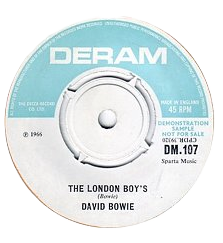
"The London Boys" is a song by the English musician David Bowie. It was first released as the B-side of the single "Rubber Band" in the United Kingdom on 2 December 1966. It was originally written and demoed in 1965 with the Lower Third for potential release as the artist's debut single for Pye Records but it was rejected. After a year of rewrites, he recorded a new version with a new band, the Buzz, which helped secure him a record contract with Decca-subsidiary Deram Records. Unlike the A-side, "The London Boys" retains the Mod feel of Bowie's previous singles. The dark lyrics concern a 17-year-old who leaves home for London and becomes embroiled in the Mod scene, turning to pills to fit in. Like his previous singles, it failed to chart. Decca later issued it as an A-side in 1975.
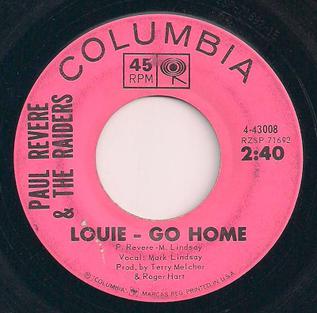
"Louie, Go Home" is a song written by Paul Revere and Mark Lindsay as a sequel after Richard Berry declined their request for a follow-up to "Louie Louie". It was recorded by Paul Revere and the Raiders in 1963 and released in March 1964.

The Sandpipers were an American easy listening trio who carved a niche in 1960s folk rock with their vocals and innovative arrangements of international ballads and pop standards. They are best remembered for their cover version of "Guantanamera", which became a transatlantic top 10 hit in 1966, and their top 20 hit "Come Saturday Morning" from the soundtrack of the film The Sterile Cuckoo in 1970.

Kinksize Session is the first EP released by the Kinks in the UK in 1964, a month after their debut LP. The tracks were all exclusive to this release and it includes some original compositions.
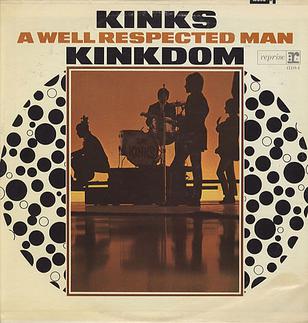
Kinkdom is a studio album by the English rock band the Kinks. Released in the United States and Canada on 24 November 1965, it was their fourth album issued on Reprise Records. It peaked at number 47 on the Billboard album chart.
